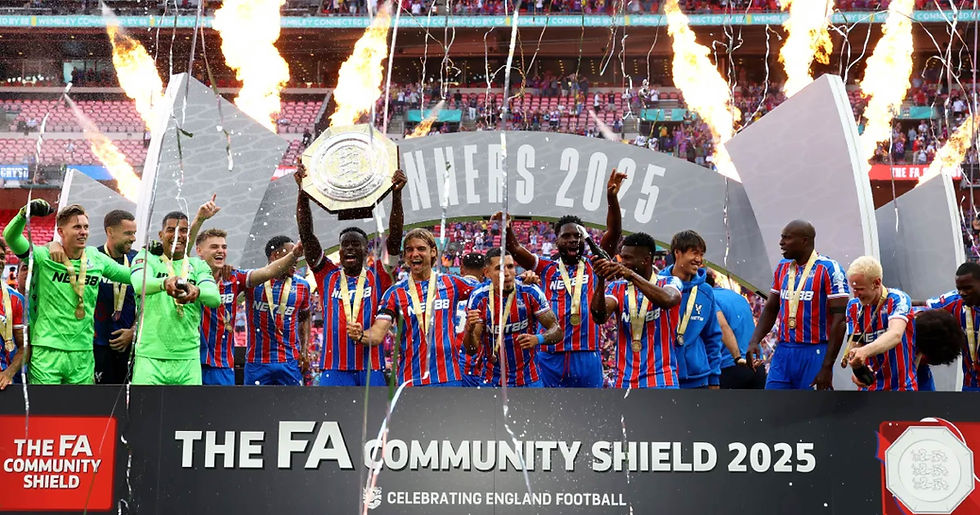Football for All: The Soccerwise Programme and Community Campus as a National Youth and Community Engagement Model
- Aug 11, 2025
- 3 min read

Introduction
The Football Association’s Community Shield at Wembley is the annual curtain raiser to the new season, which saw Premier League Champions Liverpool play FA Cup winners Crystal Palace. This match sees a charitable purpose with the proceeds going towards the good of the game in our communities. However, with so much social good being contributed from the most accessible and unifying sport in the UK, can the power of football continue inspire, connect, and transform communities? The current fragmentation would suggest that continued multiple foundations, initiatives, and funding streams are limiting its impact.
The Youth Charter’s Soccerwise Programme, delivered through the Community Campus model, offers a sustainable and integrated approach to ensure that football truly becomes Football for All – inclusive, accessible, and embedded in a broader youth and community development strategy.
The Soccerwise Programme: More than a Game
Soccerwise is designed to harness football’s universal appeal while delivering measurable outcomes in:
Education – improving attendance, attainment, and life skills.
Health and Wellbeing – promoting physical activity, mental health awareness, and healthy lifestyles.
Social Inclusion – tackling discrimination, promoting equality, and building cross-community cohesion.
Skills and Employability – linking football activities to vocational training, volunteering, and employment pathways.
The programme integrates anti-racism education, cultural competency, and positive role modelling, ensuring football environments are safe, welcoming, and empowering for all young people.
The Community Campus Youth & Community Model
The Community Campus transforms local facilities, such as schools, leisure centres, youth clubs into multi-use hubs that bring together sport, art, culture, digital skills, and social action. Within this framework, football acts as the gateway activity to broader engagement:
Sport for Development – using football as the entry point but offering progression into other sports and activities.
Arts and Culture – linking football programmes with music, theatre, visual arts, and creative media.
Community Safety – providing structured, supervised, and aspirational opportunities that reduce anti-social behaviour.
Family and Community Engagement – involving parents, local leaders, and businesses in co-design and delivery.
Aligning with National Priorities
The Soccerwise Community Campus approach directly supports government priorities outlined in the £88m Building Creative Futures package and the forthcoming National Youth Strategy:
Better Youth Spaces – repurposing pitches, clubhouses, and community facilities as multi-activity hubs.
Million Hours Fund – delivering structured, safe, and inspiring football sessions throughout the year.
Local Youth Transformation Pilot – providing a tested, high-quality, inclusive model of football-led community engagement.
Enrichment in Schools – embedding football programmes that develop teamwork, leadership, and resilience alongside academic learning.
Addressing Inequality and Building Inclusion
Football’s power is undermined when access is unequal or when discrimination is unchecked. Soccerwise embeds the principles outlined in A Community Shield of Hope?:
Separating talent ID from community provision to ensure inclusivity.
Providing anti-racism and cultural competency training for coaches, volunteers, and leaders.
Ensuring diverse leadership across delivery teams.
Documenting and addressing discriminatory incidents while celebrating positive role models.
From social engagement & Grassroots to Government: A Call to Action
We propose that the Government, football’s governing bodies, and community stakeholders adopt the Soccerwise Community Campus model as a national framework for Football for All. This would:
Coordinate existing football foundations and trusts into a shared delivery ecosystem.
Pool funding, facilities, and expertise for maximum reach and efficiency.
Standardise impact measurement to demonstrate tangible outcomes in health, education, inclusion, and community safety.
Embed football within a whole-life skills pathway, ensuring every young person benefits regardless of ability or background.
Conclusion
Football is more than a sport, it is a language, a culture, and a tool for change. The Youth Charter’s Soccerwise Programme and Community Campus model can turn “Football for All” from a slogan into a reality. By linking the game to wider youth and community outcomes, and aligning with government policy, we can create a national legacy of opportunity, inclusion, and hope, a true community shield for the future.





Comments